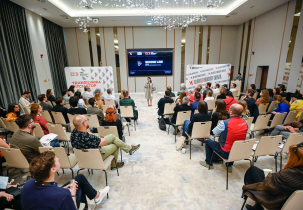
Agustí Villaronga: „Women carry the weight.”
Agustí Villaronga came to the interview with his pal, writer Antoni Aloy, who helped him in „mediating our English”. They were incredibly fun to speak with and at the same time we had a very good exchange of ideas.
How do you find TIFF and Cluj in the short time you’ve been here?
It’s nice, very nice. I was in Romania many years ago, but only in Bucharest. But then I met Mihai at a festival a few years back and now I’m here and I love it.
Do you think there are other films of yours that represent you more than the ones selected by TIFF?
I made eight or nine films and they asked me to choose three that represent me best. This three are the ones that describe best my life work, my job. They represent different moments in my life. Crystal Cage is my first film, The Sea is in the middle and Black Bread is the latest, the film most connected with the audience. Everything is easier to understand for the audience.
Can you give us some examples of cinema influences in your career?
Hitchcock, the way he used storytelling. The way he created mystery, the specific atmosphere. I love his films. I try to feel them, to understand them differently. Also, the directors now, the Lynch generation, I love them. But the most interesting director for me right now is Michael Haneke, I love him.
Are your movies more about the Catalan society than the Spanish one?
Not really. I think only two of my films are very connected to the Catalan society. But not to the present society – we are talking about years ago, after the civil war. We talk about Catalan people in those films, but not the others. It is not my number one theme.
Did your post-civil war childhood influence the topics of your movies?
Of course, for me it’s easy to understand the perspective of a child after the war. I lived in those times.
In your movies how do you relate to the representation of women?
Normally I like to think that, in my films, women are very strong. They are sweet, but strong. Women are usually depicted as objects of desire, of attraction, but in my films they are complete human beings. There are a lot of women in my films, more than men. I love how women are. They become almost invisible in the world of men, but they are the ones that carry the weight. All of the women in my films are very human, and this kind of humanity makes them better persons.
Article published in AperiTIFF.





